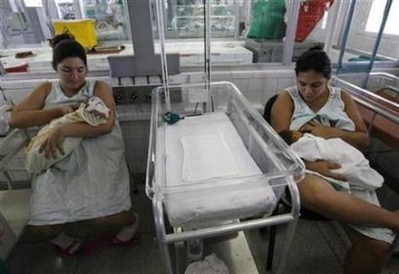Study shows breast-fed children are smarter
Updated: 2008-05-07 08:50
WASHINGTON -- A new study provides some of the best evidence to date that breast-feeding can make children smarter, an international team of researchers said on Monday.
Children whose mothers breast-fed them longer and did not mix in baby formula scored higher on intelligence tests, the researchers in Canada and Belarus reported.
About half the 14,000 babies were randomly assigned to a group in which prolonged and exclusive breast-feeding by the mother was encouraged at Belarussian hospitals and clinics. The mothers of the other babies received no special encouragement.
|
|
Those in the breast-feeding encouragement group were, on average, breast-fed longer than the others and were less likely to have been given formula in a bottle.
At 3 months, 73 percent of the babies in the breast-feeding encouragement group were breast-fed, compared to 60 percent of the other group. At 6 months, it was 50 percent versus 36 percent.
|
|||
The children were monitored for about 6 1/2 years.
The children in the group where breast-feeding was encouraged scored about 5 percent higher in IQ tests and did better academically, the researchers found.
Previous studies had indicated brain development and intelligence benefits for breast-fed children.
But researchers have sought to determine whether it was the breast-feeding that did it, or that mothers who prefer to breast-feed their babies may differ from those who do not.
The design of the study -- randomly assigning babies to two groups regardless of the mothers' characteristics -- was intended to eliminate the confusion.
'MOTHERS WHO BREAST-FEED ... ARE DIFFERENT'
"Mothers who breast-feed or those who breast-feed longer or most exclusively are different from the mothers who don't," Dr. Michael Kramer of McGill University in Montreal and the Montreal Children's Hospital said in a telephone interview.
"They tend to be smarter. They tend to be more invested in their babies. They tend to interact with them more closely. They may be the kind of mothers who read to their kids more, who spend more time with their kids, who play with them more," added Kramer, who led the study published in the journal Archives of General Psychiatry.
The researchers measured the differences between the two groups using IQ tests administered by the children's pediatricians and by ratings by their teachers of their school performance in reading, writing, math and other subjects.
Both sets of scores were significantly higher in the children from the breast-feeding promotion group.
The study was launched in the mid-1990s. Kramer said the initial idea was to do it in the United States and Canada, but many hospitals in those countries by that time had begun strongly encouraging breast-feeding as a matter of routine.
The situation was different in Belarus at the time, he said, with less routine encouragement for the practice.
Kramer said how breast-feeding may make children more intelligent is unclear.
"It could even be that because breast-feeding takes longer, the mother is interacting more with the baby, talking with the baby, soothing the baby," he said. "It could be an emotional thing. It could be a physical thing. Or it could be a hormone or something else in the milk that's absorbed by the baby."
Previous studies have shown babies whose mothers breast-fed them enjoy many health advantages over formula-fed babies.
These include fewer ear, stomach or intestinal infections, digestive problems, skin diseases and allergies, and less risk of developing high blood pressure, diabetes and obesity.
The American Academy of Pediatrics recommends that women who do not have health problems exclusively breast-feed their infants for at least the first six months, with it continuing at least through the first year as other foods are introduced.
|
||
|
||
|
|
|
|




